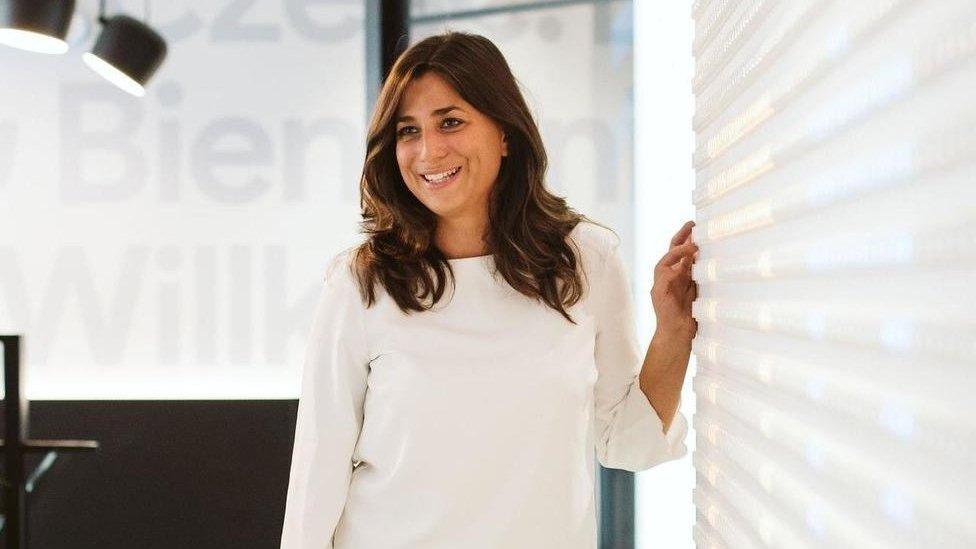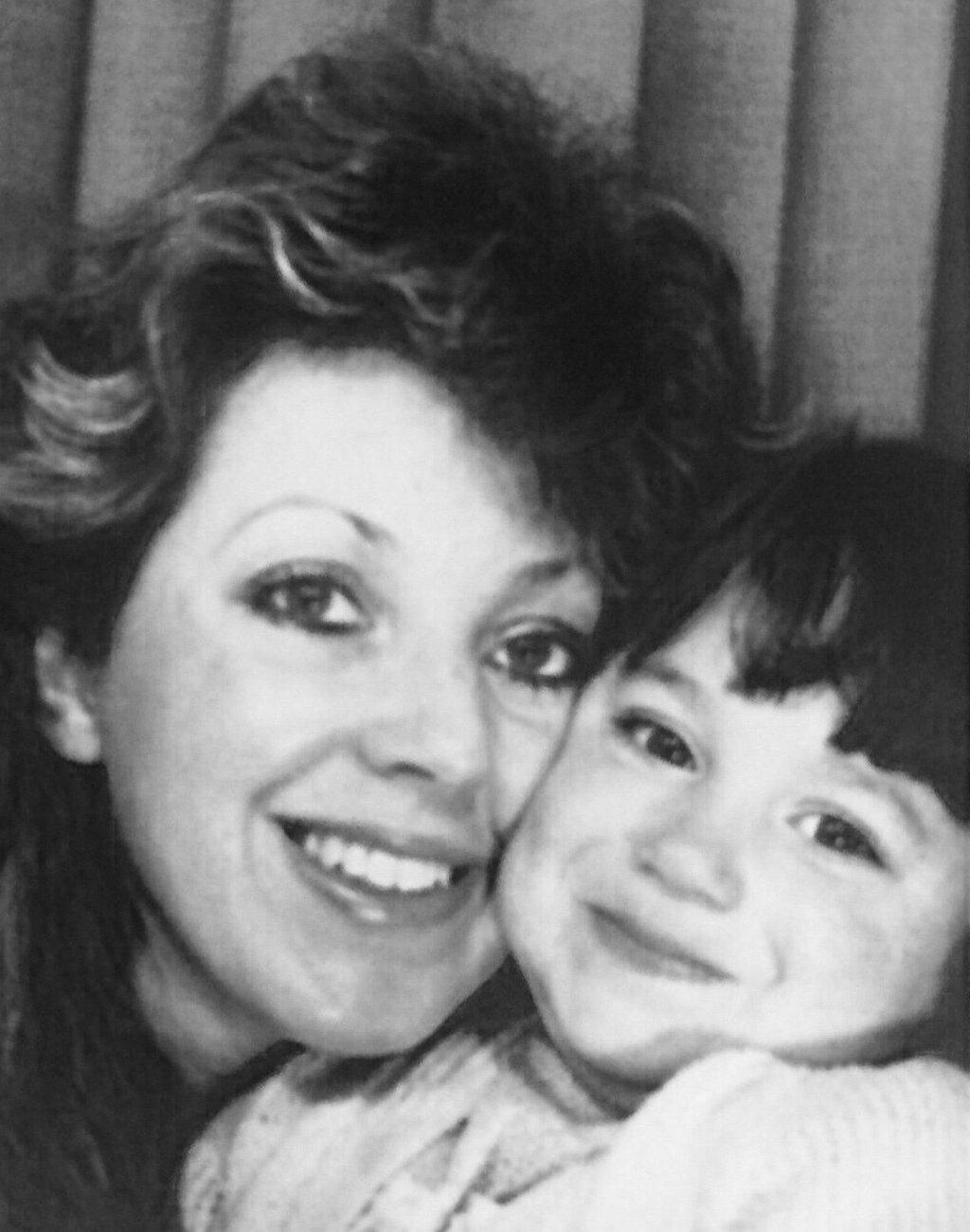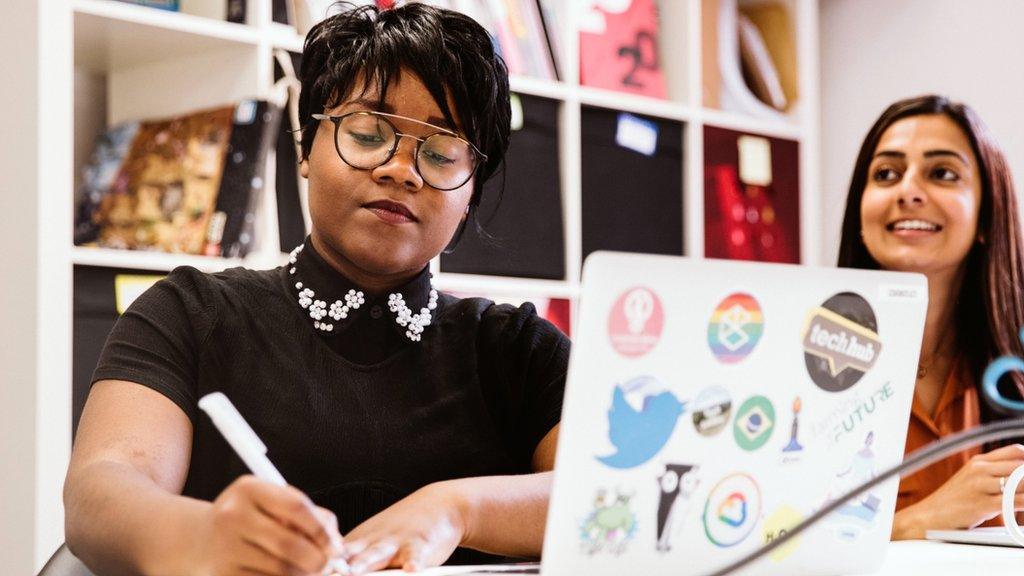CEO Secrets: 'Perfectionism can hold women back'
- Published
WATCH: Anna Brailsford shares her CEO Secrets
As part of our business advice series CEO Secrets, Anna Brailsford of Code First Girls, discusses a personality trait that she thinks holds many women back in their careers - and reveals her way to overcome it.
Anna Brailsford became CEO of Code First Girls in 2019.
Her organisation selects and trains women up with software skills for free and then connects them with companies such as Goldman Sachs, Bank of America and Google as potential employees.
Since 2015 it has trained more than 28,000 women in the UK.
"Something I see within the Code First Girls community is that women are complete perfectionists. We hold ourselves to really, really high standards," says Brailsford.
"I used to be one so I can't blame them."

Large companies sponsor the coding courses run by Code First Girls
She forced herself to change because she realised it can actually hold you back, whether you are in a boardroom, or learning to code for the first time.
"As a female entrepreneur [or business leader] you can be too afraid of failure. We need to learn to push ourselves out of our comfort zone and embrace risk more."
In Brailsford's case, she thinks the character trait can be traced back to her childhood.
"I used to compare myself a lot to my older brother growing up. If he failed it wouldn't bother him, he would just dust himself off, get up and try again.
"But I would dwell on failure. It would bother me, it would eat away at me. It's a different type of psyche. I found it harder emotionally to move on."

Brailsford says the pressure of striving for the best academic grades at school compounded her fear of failure
"Fail fast" and learn from your mistakes is a well-known mantra among Silicon Valley start-ups. Brailsford thinks women in particular need to embrace this mindset.
She's trained herself to be "more forgiving", to focus less on the perfection of the task and more on the way it is executed and what can be learned along the way.
"I do something that forces me out of my comfort zone at least once every day," she says. "This produces two feelings - one of anxiety and one of adrenaline. Slowly you get to enjoy the feelings."
Like many female CEOs, especially in the technology sector, Brailsford says she had a lack of role models.
However, she was fortunate enough to have one close to home growing up.
She and her brother were raised by a single mum who created an education technology start-up in the health and social care sector.

Anna Brailsford with her mother, who is also an entrepreneur

"My mother, without me even realising it, was actually teaching me all the basics of entrepreneurship at the dinner table," says Brailsford.
She would often help her mum with her business while on holiday from university, so learned a lot of the practicalities of running a tech firm, like product development and licensing.
But perhaps more crucial were the soft skills and other insights.
"Things that now feel like instinct, I now realise I learned by witnessing my mum. I absorbed how tough it is to be a woman in the business world, you have to fight hard.
"She always told me you had to work 10 times harder than your male counterparts, so when I came to these types of roles, I already sort of knew what it was going to take."
Statistics showing how few female entrepreneurs manage to get start-up investment demonstrates how the odds are still stacked against women, says Brailsford.
A recent report, external looking at venture capital funding in the UK between 2009 and 2019 found that nearly 70% of it went to all-male teams and just under 3% to all-female teams - a pattern spotted in other studies too.

Code First Girls has trained more than 28,000 women in the UK since 2015
Brailsford's Code First Girls is a mixture of a training and recruitment company, operating on a not-for-profit basis. It addresses the IT skills shortage in the UK, while helping women find fulfilling careers.
The companies it works with sponsor the courses and also pay for the help in filling positions. They are often keen to recruit more women - due to targets and also to better represent their customers - but struggle to find enough candidates because so few women study computer science.
Brailsford thinks business culture is modernising and gender relations have improved at boardroom level - a transition that organisations like Code First Girls can help with - but bigger battles lie ahead.
A lot of investment has gone into getting more women into leadership positions in the technology world, she says.
But the task remains to get rid of the "toxic boys club" legacy that still persists in some areas, she believes.
"If that still exists, those women who've arrived are going to be driven away and we're going to have to start all over again."
You can follow CEO Secrets reporter Dougal Shaw on Twitter: @dougalshawbbc, external